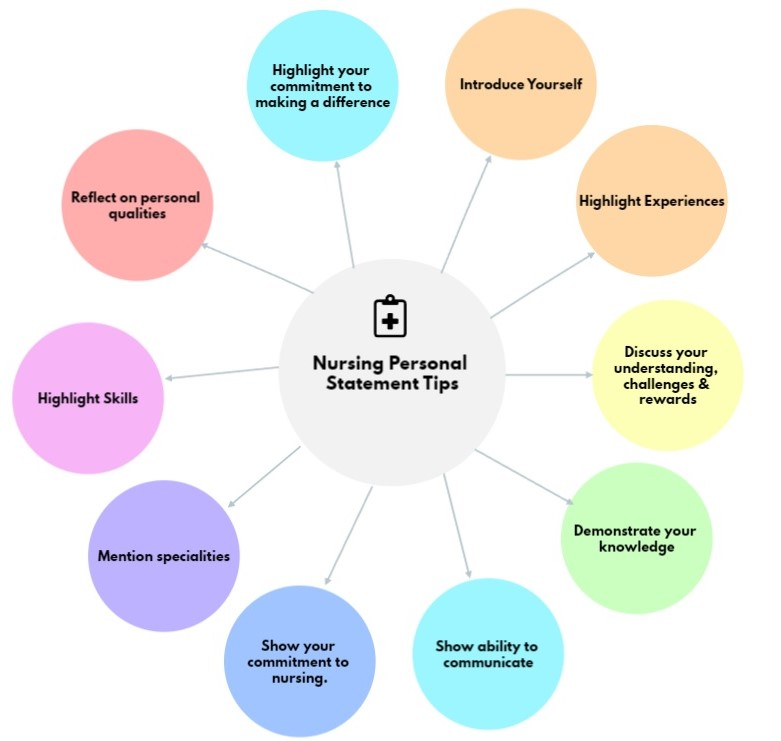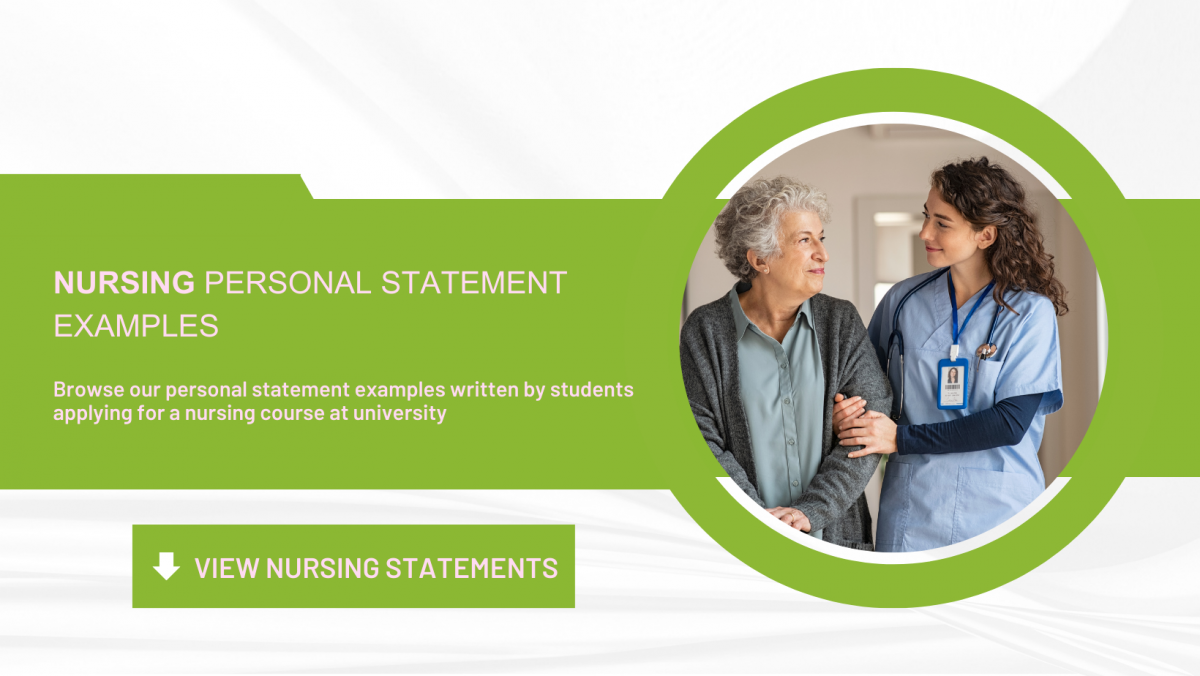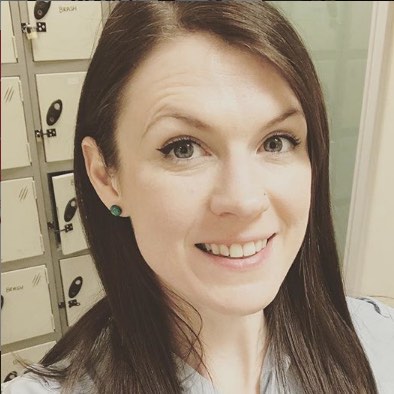

Impactful Personal Statement Examples Nursing
Impactful Personal Statement Examples Nursing: A Guide For Aspiring Nurses
The personal statement is a crucial component of your nursing school application. It allows you to showcase your passion for nursing, convey your unique qualities, and demonstrate why you are an ideal candidate.
Crafting an effective nursing personal statement requires careful thought, reflection, and attention to detail.
In this blog post, we will provide a step-by-step guide on writing a compelling statement with personal statement nursing examples that will help you stand out from the competition.
Do you need professional help with writing your Nursing Personal Statement?
If you require extensive editing and need help creating the content for your nursing personal statement, order my personal statement editing service . I will use my years of experience in the healthcare admissions field to create a compelling story based on your unique experiences. I will directly edit your draft until it is perfect and ready to submit.
Table of Contents
- Personal Statement Examples Nursing (Example 1)
- Personal Statement Keywords for Nursing
- Step-by-step Personal Statement Guide
- Nursing Personal Statement (Example 2)
Nursing Personal Statement Keywords
Reading the above personal statement for nursing will highlight the themes that you must include in your statement:
Compassion
These are known as the 6Cs, which are a set of core values required in nursing. The NHS drew up these values and need to be met by those working in a caring environment.
Another key theme is REFLECTION
The nursing applicant focuses their personal statement around what they have learned from the experiences they have had. S/he mentioned the positive and negative aspects of the role, the challenges and how these would be overcome. Being able to manage stress and emotionally demanding situations is very important within nursing.
Step-by-step - Nursing Personal Statement Guide
Introduction.
Your motivation & purpose.
Begin by reflecting on your personal and professional journey that led you to pursue a career in nursing.
What experiences or encounters have shaped your desire to become a nurse?
Was it a personal illness , a family member’s health struggle , or a transformative encounter with a healthcare professional ?
Identify and articulate the driving force behind your decision to pursue nursing as a profession. This will form the foundation of your personal statement and help you convey your genuine passion.
Starting your personal statement for nursing can be the most difficult part, so I recommend writing the introduction last.
Get the Full Nursing Personal Statement Guide & Template
Body of the personal statement.
Next, identify and highlight experiences that have influenced your decision to become a nurse. These can include volunteering , work experience, or even personal caregiving experiences. Discuss how these experiences have contributed to your growth, shaped your values, and reinforced your commitment to the field of nursing. Be specific and provide concrete examples to demonstrate your engagement and dedication.
Body – Paragraph 1
Work experience or shadowing
Describe the setting you were in. Who were you helping? Did you work independently or in a team?
Were you just observing? What did you see? Which skills did you see being used? How have you developed these skills and how do you hope to further enhance them?
Mention any challenges you encountered or positive aspects of the role that really appeal to you.
Volunteering/ charity work
Nursing requires a unique set of skills and qualities. Your nursing personal statement should identify the ones you possess and illustrate how they align with the demands of the nursing profession. Compassion, empathy, problem-solving , and effective communication are just a few examples of essential nursing skills. Share stories or experiences highlighting how you have demonstrated these through volunteering or a job you worked in.
Body – Paragraph 3
Extracurriculars / hobbies/ values
In today’s diverse healthcare landscape, cultural competence is highly valued in nursing. Showcasing your understanding and appreciation for cultural diversity is essential. Highlight experiences that have exposed you to diverse populations through volunteer work, community engagement, or international experiences.
Discuss how these experiences have broadened your perspective and shaped your ability to provide patient-centred care to individuals from different backgrounds. Show your understanding of the NHS values- respect for dignity, cultural differences and choices.
Body – Paragraph 4
Here you can discuss more of your experiences and/or mention your goals.
Admissions committees are interested in understanding your aspirations and future goals as a nurse. Share your vision for your nursing career and the impact you hope to make in the field. Discuss specific areas of interest, such as paediatric nursing, geriatric care, or mental health nursing, and explain why these areas resonate with you.
Your nursing personal statement should demonstrate that you have a clear direction and are committed to lifelong learning.
Summarise your top experiences and reiterate your motivation & commitment.
Keep this short and sweet. 2 – 3 sentences is usually enough!

Personal Statement Nursing Examples - 2
Shadowing at an NHS GP clinic rooted my fascination for the healthcare field. I spent many hours shadowing various members of the team, including the nurses, doctors and physician associates. Nursing sparked my interest as it combined science with compassion and problem-solving. The ability to work in a close-knit team to provide quality care to a diverse patient base solidified my enthusiasm for nursing. What really surprised me was the progression there is within nursing, from specialising to advancing your competencies in areas that interest you. I found that there would always be challenges within the role and continual changes to adapt to. This did not deter me. In fact, it heightened my motivation. There was one case that transformed my view of healthcare. It was a young man who attended and shared his concerns regarding his mental health. This hit close to home as my brother previously opened up about his negative thoughts, as he had felt lost and unable to share his emotions due to social stigmas. I felt the power that the doctor had in allowing him to open up and direct him to the relevant services, which immediately gave him hope and comfort. This compassionate care was evident throughout my time at the clinic. I additionally saw how crucial it was to have excellent written and verbal communication, as the team were constantly in touch with other services, hospitals and clinics. To develop my skillset and better prepare for nursing, I became a listening volunteer for the Samaritans. I regularly listen to the concerns of those who are suffering from a mental health crisis or require a listening ear. This requires sensitivity, empathy and active listening. I have learned a lot about communication and how to approach delicate situations, which has given me the confidence to work with patients and someday care for their mental health. Mental health nursing would be an avenue that aligns with my interest and I hope to progress my career in this direction someday. To further my experiences, I studied biology and chemistry to better understand the impact of medication, as well as learn the biological components that make up the human body. I read beyond my school syllabus and learned that medical interactions and drugs could cause side effects that vary between individuals. This tied in with what I learned about anti-depressants at the GP clinic. Learning about new medication and research taught me that a career in nursing will always require continuous learning and reading to keep up-to-date. Healthcare is constantly changing, and the recent pandemic proved that there may be new viruses that will change the way we practice. The pandemic also highlighted the role that nurses have on the frontline. A considerable commitment is required to put the patients first and have the courage to prioritise the patient’s safety. I have built my courage and mental strength while dealing with my family’s healthcare issues; as my dad suffers from sarcoidosis, I regularly see how the fatigue impacts him. Chronic pains and aches require my siblings and me to make an extra effort at home to help financially and care for him. Aside from my education and caring for my dad, I spend time carrying out my hobbies of reading and dancing. Dancing involves a lot of choreography, coordination and teamwork to be synchronised. I often teach others in the group and am open to learning new dance styles. Reading fiction helps me to zone out and de-stress. I hope to join a dance society while at university, as this will help me to keep fit and manage any stresses that nursing can bring. Volunteering, shadowing and my extracurricular research have led me to this application. It would be an honour to provide quality and compassionate care to the diverse patients within the NHS. Therefore, I plan to commit myself to learning to provide the best possible care to the patients I will someday care for.
Personal Statement Editing Service
Personal Statement Review with Dr Radhika
Volunteering Ideas

- Personal Statement
- Personal Statement Examples
- Uncategorized
Input your search keywords and press Enter.

Band 6 Nurse Personal Statement Examples & Tips | Get Helpful Advice from CVLocum
Get a Head Start on Writing Your Nurse Personal Statement with our Band 5, 6, and 7 Examples.
A nursing personal statement is one of the essential elements of a successful nursing application. It is a chance to showcase your skills, knowledge, and experiences that make you the best possible candidate for the course and the profession.
For a band 6 nursing personal statement, you need to provide detailed evidence of your abilities, including communication skills, multi disciplinary working, and evidence-based practice. In this blog post, we will explore some successful examples of band 6 nurse personal statements, highlighting what you should include and how you can make your statement unique.
What to Include in a Nursing Personal Statement
Writing an effective personal statement is important because it serves as a reflection of one’s passion, commitment, and suitability for a career in nursing.
It provides an opportunity to showcase relevant experiences, skills, and qualities that make an individual a strong candidate for nursing school or a nursing position. A well-crafted personal statement allows applicants to convey their understanding of the nursing profession, their motivation for choosing this path, and their potential to contribute to the field.
It helps admissions committees and employers gain insight into an applicant’s character, values, and potential for success as a registered nurse. A compelling personal statement can set an applicant apart from others and demonstrate their genuine desire to make a positive impact on the lives of patients and the healthcare community as a whole.

Related: Crafting the Perfect CV Nurse Writing Tips, Templates and examples included.
Related: 11 Example Nurse Safeguarding Questions for Interview + Answers | CVLocum
It is worth mentioning these important points when writing your nursing personal statement:
– Introduce yourself and explain your passion for nursing.
– Highlight any relevant experiences, such as clinical placements or healthcare volunteering, and describe how they have shaped your desire to pursue nursing as a career.
– Discuss your understanding of the nursing profession, including the challenges and rewards it entails.
– Demonstrate your knowledge of and commitment to providing compassionate and patient-centred care.
– Emphasise your ability to communicate effectively with patients, families, and a multi disciplinary team.
– Showcase your dedication to lifelong learning and medical profession development in the field of nursing.
– Discuss any specific areas of nursing that you are particularly interested in or have experience in, such as adult nursing, mental health nursing, or paediatric nursing.
– Highlight any relevant skills and qualities, such as empathy, resilience, problem-solving, and critical thinking.
– Reflect on any personal qualities or experiences that have prepared you for a career in nursing, such as being a good listener, working well under pressure, or being able to adapt to changing situations.
– Conclude by summarising your commitment to making a positive difference in the lives of patients and your enthusiasm for embarking on a nursing career.

Example of Band 6 Personal Statement:
A Band 6 person statement may differ from other bands as it represents a higher level of experience, expertise, and responsibility. As a Band 6 Registered nurse, you are expected to demonstrate advanced clinical skills, leadership abilities, and the capacity to work autonomously.
Additionally, showcasing your ability to adapt to changing healthcare environments and your dedication to delivering person-centred care will set you apart as a strong candidate for a Band 6 nursing role.
Band 6 Personal Statement Example 1:
”As a dedicated and compassionate nurse, I am excited to apply for the Band 6 position in your hospital. With several years of experience working in various healthcare settings, I have developed a deep understanding of patient care and a passion for delivering high-quality services.
My clinical expertise extends across different specialties, including medical-surgical, paediatric, and geriatric nursing. I pride myself on my ability to establish therapeutic relationships with patients and their families, providing empathetic and patient-centred care.
My goal is to contribute to the enhancement of healthcare delivery, advocate for patient rights, and promote evidence-based practice. I believe that my experience, skills, and passion make me a strong candidate for the Band 6 role, and I am eager to contribute to the team and make a positive difference in the lives of patients”
Band 6 Personal Statement Example 2:
”As an experienced nurse with a strong passion for patient care since a young age, I am enthusiastic about the opportunity to join the your team. With a solid foundation in various healthcare settings, I possess the skills and knowledge necessary to provide compassionate and evidence-based care.
My commitment to continuous professional development ensures that I stay up-to-date with the latest advancements in nursing practice. I thrive in collaborative environments and am dedicated to working alongside interdisciplinary teams to achieve optimal patient outcomes.
With a patient-centred approach and a focus on delivering high-quality care, I am confident in my ability to make a positive impact as a Band 6 nurse.”

Adult Nursing Personal Statement Example:
Your adult nursing personal statement should highlight your knowledge and skills related to adult care. Additionally, showcasing your understanding of the unique challenges and needs of adult patients.
Your personal statement should also highlight your commitment to continuing professional development and your dedication to staying updated with evidence-based practices in adult nursing.
Adult Nursing Personal Statement Example 1:
”I have always been passionate about providing high-quality care to individuals during their most vulnerable moments. As an aspiring adult nurse in the UK, I am dedicated to making a positive impact on the lives of adult patients and their families in your nursing home.
I possess excellent communication skills, enabling me to establish trusting relationships with patients and effectively collaborate with interdisciplinary teams. My empathetic nature and ability to remain calm under pressure allow me to provide compassionate support to patients facing challenging health conditions.
With a commitment to lifelong learning and a desire to continuously enhance my skills, I am eager to embark on the next step of my career as an adult nurse, contributing to the well-being of individuals in need.”
Adult Nursing Example 2:
”I am a dedicated and compassionate nurse and particularly a nurse for elderly patients. Through my experience as a healthcare assistant, I have developed essential skills in administering medications, providing personal care, and supporting patients with diverse needs.
I possess excellent communication and teamwork abilities, which enable me to establish rapport with patients and collaborate effectively with healthcare professionals. With a focus on delivering patient-centred care, I am committed to upholding the highest standards of nursing practice.
I am excited to embark on the next chapter of my career as an adult nurse in your nursing home and make a positive impact on the lives of individuals in need.”
Example of Band 5 Personal Statement:
Band 5 personal statement example 1:.
”As an enthusiastic and dedicated nurse, I am excited to start my career as a Band 5 nurse after completing my nursing degree. With extensive experience in various healthcare settings, including medical-surgical units and mental health facilities, I possess strong assessment and medication administration skills.
I excel in building rapport with patients, families, and interdisciplinary teams, prioritising effective communication. Committed to lifelong learning, I stay updated with evidence-based practices to provide high-quality care.
With my passion for nursing and drive for continuous improvement, I am ready to make a positive impact as part of a healthcare team as that is where my own personal fulfilment lies.”
Band 5 Example 2:
”As a passionate and caring individual, I am thrilled to embark on my journey as a Band 5 nurse. With a solid foundation in nursing education and hands-on clinical experience, I have honed my skills.
I am adept at fostering therapeutic relationships with patients and their families, providing emotional support, and promoting their well-being. Collaborating effectively with healthcare teams is a priority for me, as I believe in the power of multidisciplinary care to achieve optimal patient outcomes.
Through ongoing professional development and a commitment to evidence-based practice, I strive to deliver compassionate and patient-centred care. With a strong work ethic and a genuine passion for nursing, I am eager to contribute to the healthcare profession.”
Example of Band 7 Personal Statement:
Band 7 personal statement example 1:.
”As an experienced Band 7 nurse, I am dedicated to delivering exceptional patient care, leading quality improvement initiatives, and mentoring junior staff.
With advanced clinical expertise and a commitment to ongoing professional development, I strive to enhance patient outcomes through evidence-based practices. By fostering collaborative relationships and prioritising patient well-being, I create a supportive and innovative healthcare environment.
I am eager to utilise my skills and passion for nursing to make a positive impact.”
Band 7 Example 2:
”As a Band 7 nurse, I want to feel a high level of job satisfaction in a rewarding field of healthcare, I possess extensive clinical knowledge and leadership skills that enable me to deliver high-quality care and drive positive change in healthcare settings.
With a focus on evidence-based practice, I continuously seek opportunities for professional development and stay abreast of advancements in nursing. Through effective communication, teamwork, and a patient-centred approach, I strive to provide personalised care and create a supportive environment for both patients and colleagues.
With a strong commitment to excellence and a passion for nursing, I am dedicated to making a meaningful impact in the field.”

Conclusion:
In conclusion, a nursing personal statement is a chance to showcase your skill sets, knowledge, and nursing experience that make you the best possible candidate for the profession. Emphasise your passion, commitment, and desire to provide the best possible care for patients.
Good luck in your journey towards becoming a great nurse!
Ready to find a Job and Enhance Your Nursing Career?
To find a job, you can browse our job board with hundreds of Nursing roles waiting for someone like you!

Healthcare Assistant Isle of Man £24,965p/a+
Band 5 nurse | hillingdon | £22.04 – £28.67p/h, band 5 nurse | cheshire | £19.06 – £35.52p/h, theatre nurse stockport £30p/h+, scrub nurse wigan £30p/h+, renal nurse oldham £40p/h+, registered mental health nurse salford £20p/h+, registered general nurse rochdale £30p/h+, recovery nurse sale £30p/h+.

Nursing Personal Statement Examples
- 1 Personal Statement Example Links
- 2 Career Opportunities
- 3 UK Admission Requirements
- 4 UK Earnings Potential For Nurses
- 5 Similar Courses in UK
- 6 UK Curriculum
- 7 Alumni Network
Personal Statement Example Links
- Personal Statement Example 1
- Personal Statement Example 2
- Personal Statement Example 3
- Personal Statement Example 4
- Personal Statement Example 5
- Personal Statement Example 6
Ever felt a calling to provide compassionate care and support to those in need? Fascinated by the world of healthcare and the vital role nurses play in it?
If so, a degree in Nursing could be your perfect journey. This noble profession will equip you with the skills and knowledge to care for patients across the lifespan, advocate for health and wellbeing, and contribute to public health.
Nursing is an incredibly important profession that helps to ensure the health and well-being of individuals and communities. A university course in nursing is an interesting and relevant choice for students because it provides them with the opportunity to gain the knowledge and skills necessary to become a successful nurse.
The course covers a wide range of topics, from anatomy and physiology to pharmacology and medical ethics. Students will learn how to assess and diagnose patients, administer medications, and provide patient care. They will also gain an understanding of the legal and ethical considerations involved in providing healthcare.
Additionally, the course will provide students with the opportunity to develop their communication and interpersonal skills, which are essential for success in the nursing profession. Ultimately, a university course in nursing is an interesting and relevant choice for students who are looking to pursue a career in the healthcare field.
Nursing is a rewarding and challenging career that requires a strong commitment to providing quality care to patients. Writing a personal statement for a nursing course can be daunting, but it’s important to remember that the admissions committee wants to get to know you and understand why you’re passionate about the field.
👍 When writing a personal statement: Highlight your passion for the course, demonstrating your understanding of it. Use relevant personal experiences, coursework, or work history to showcase how these have fostered your interest and readiness for the course.
Career Opportunities
A nursing degree can open the door to a wide variety of career opportunities. Nurses can work in hospitals, medical clinics, long-term care facilities, home health care, public health, schools, research, and much more.
Hospital Nursing: Nurses in hospitals provide direct care to patients in a variety of settings, such as emergency rooms, intensive care units, operating rooms, and medical-surgical units. They may also work in specialty areas such as pediatrics, oncology, or labor and delivery.
Clinic Nursing: Nurses in clinics provide primary care to patients in a variety of settings, such as family practice, internal medicine, and obstetrics and gynecology. They may also work in specialty clinics, such as oncology, cardiology, or orthopedics.
Long-Term Care Nursing: Nurses in long-term care facilities provide care to patients with chronic illnesses or disabilities. They may work in nursing homes, assisted living facilities, or hospice settings.
Home Health Care Nursing: Nurses in home health care provide care to patients in their own homes. They may work with patients who are recovering from an illness or injury, or those with chronic conditions.
Public Health Nursing: Nurses in public health work to promote health and prevent illness in communities. They may work in a variety of settings, such as schools, community health centers, or public health departments.
UK Admission Requirements
In order to be accepted into a nursing course at a UK university, applicants must have achieved a minimum of five GCSEs at grade 4 or above, including English and Maths. Additionally, applicants must have a minimum of two A Levels at grade C or above, or the equivalent qualifications.
The entry criteria for a nursing course is more stringent than other courses, as applicants must demonstrate a high level of academic achievement and a commitment to the profession. Applicants must also pass a Disclosure and Barring Service (DBS) check in order to be accepted onto the course.
In addition to the academic requirements, applicants must also demonstrate that they have the necessary skills, knowledge and understanding to be successful on the course. This includes having good communication skills, being able to work in a team, and having a good understanding of the principles of nursing.
Finally, applicants must also demonstrate that they have the necessary personal qualities to be a successful nurse, such as empathy, compassion and resilience.
UK Earnings Potential For Nurses
The average salary for a nurse in the UK is around £26,500 per year. This can vary depending on experience, qualifications, and the type of nursing role. Nurses in the NHS are typically paid on a banding system, with salaries ranging from £24,214 to £30,112 for a Band 5 nurse.
In terms of trends in the job market, nursing is a growing profession with an increasing demand for qualified nurses. According to the NHS, the number of nurses in the UK has increased by more than 30,000 since 2010, and the demand for nurses is expected to continue to rise in the coming years. This is due to an aging population, increased demand for healthcare services, and a shortage of qualified nurses. As a result, salaries for nurses are likely to remain competitive in the future.
Similar Courses in UK
Other university courses related to nursing include midwifery, health sciences, and health and social care. Midwifery focuses on providing care to pregnant women and their newborns, while health sciences focuses on the science behind health and wellbeing. Health and social care looks at the social aspects of health and how to provide care in a variety of settings. The key difference between nursing and these other courses is that nursing focuses on providing direct patient care, while the other courses focus on more specialized areas of care.
UK Curriculum
The key topics and modules covered in the nursing course in the UK Curriculum typically include:
• Professionalism and legal and ethical issues in nursing • Health and social care • Anatomy and physiology • Pathophysiology • Pharmacology • Health promotion • Mental health • Clinical skills • Nursing research • Clinical decision making • Clinical placement
In addition to the theoretical modules, there is usually a significant practical component to the course. This usually involves hands-on experience in a clinical setting, such as a hospital, community health centre or care home. This practical work will involve a range of activities, such as observing and assisting with patient care, taking vital signs, administering medication and providing health education.
Alumni Network
Notable alumni from the University of Nursing course include Dr. Jean Watson, a renowned nursing theorist and author of the Theory of Human Caring. Dr. Watson is a leader in the field of nursing and has made significant contributions to the development of nursing theory, practice, and education.
She is a professor at the University of Colorado and has served as the president of the American Holistic Nurses Association. Dr. Watson has received numerous awards for her work, including the American Academy of Nursing Living Legend Award and the International Nurse Researcher Hall of Fame Award.
Alumni events and networking opportunities are available through the University of Nursing Alumni Association. The association hosts an annual alumni reunion, which allows alumni to reconnect with former classmates and faculty. The association also organizes networking events and professional development workshops for alumni. Additionally, the association offers an online alumni directory, which allows alumni to connect with each other and share career advice.
Reach out to us for career and sponsorship opportunities
© 2024 Acrosophy Excellence in Application
A Medical MBA Company The Medical MBA Ltd Company number: 13561401 86-90 Paul Street, London, England, United Kingdom, EC2A 4NE
- Staff and Students
- Student Life
- International
Nursing Personal Statements
- Home »
- Study »
- Undergraduate »
Your personal statement is a key aspect of the selection process.
It's your opportunity to demonstrate your drive and passion to study to become a nurse, what's inspired and motivated you to choose this profession, and to demonstrate the skills and qualities you have that will enable you to practice as a future registered nurse, showing how you can make a difference and contribute in meaningful ways when you're in post.
You need to detail the skills you have acquired such as specific communication skills, an understanding of and an ability to appreciate the needs of others such as supporting peers, and an understanding of cultural differences.
You should explain the inspiration behind your nursing field route and the sort of qualities you have that suit the programme you've chosen to apply for.
You should also show a genuine understanding of how the programme is structured and the differences between the practical and theoretical aspects of the programme.
The following tips may prove useful:
If you're applying for a degree in adult nursing you need to be able to demonstrate your ability to interact on a professional basis with adults from diverse backgrounds and ethnic groups, from young adults through to the older person and the acutely ill in hospital care, community care and end of life care.
Adult nurses also promote health, educate people how to live healthier lifestyles, assess, lead, co-ordinate, and deliver compassionate, sensitive, and culturally informed care. You need to demonstrate your knowledge of nursing in the adult field.
You should be able to evidence a wide range of personal and social interactions that support your application and highlight your qualities and strengths to the full.
Learning disabilities nurses work with people across the whole lifespan, enabling each person to reach their full potential, flourish and live their best lives. They facilitate the care and treatment of people, including advocacy to ensure the people you care for have choice, control, and independence in all aspects of their daily lives.
Working in a diverse range of settings, such as people's homes, education, residential and community centres, hospitals and specialist Autism services, learning disabilities nurses help break down barriers to reduce health inequalities. You should be aware that a learning disability diagnosis varies between all individuals, and expert nursing care can really make a vast difference to outcomes.
Mental health nurses work with patients and carers from a variety of sectors in life, supporting patients experiencing acute, complex, or long-term mental health problems.
Mental health nurses support patients to understand their situation, promote recovery and help them live independent lives using their communication, interpersonal and therapeutic skills to build positive, trusting and person-centred relationships.
This type of role may entail nursing patients with drug or alcohol abuse issues alongside the complex range of mental illnesses that can present. Mental health nursing offers a range of opportunities, including crisis care and follow-up community psychiatric nursing opportunities. Make sure you research this area well before writing your personal statement in full.
There are five key themes we look for in your personal statement. Ensuring you’ve clearly covered and addressed these will further strengthen and improve your application and hopefully secure an invitation to interview.
Making sure you’ve covered the below points will not only help you succeed in being offered an interview, but it provides excellent preparation for the interview as you’ll have already considered the key areas that will be discussed:

Book your Open Day

ORDER A PROSPECTUS
Get your copy now
Hi, what can we help you find?
- HealthJobs Ltd
- 27 June 2018
How To Write A Personal Statement For Your Next Job In Healthcare

- Matt Farrah Nurses.co.uk Co-founder / Co-owner
- Save for later
An excellent personal statement is the key to success in every healthcare job application you make and in this article we look at the steps to follow in order to create the ideal one.

If you’ve written a personal statement before for a previous job application or university course application, you can use ideas and themes from that but you can’t simply use the same one again.
A personal statement must be tailored for each situation, and when you’re applying for healthcare jobs you need to tailor it according to the person specification and job description of the vacancy you’re interested in.
Start with a brainstorm of ideas
If you try to sit down and write your personal statement from scratch by starting with the first sentence, you could find your finished personal statement has no coherence and does not follow a logical order.
By brainstorming your ideas first you can prioritise the points you want to make and assemble all the evidence you want to mention that will back up the claims you’re going to make.
In order to avoid repetition in your personal statement, pick out a couple of points you want to make in your opening statement that really establish you as a serious contender for the job; for example, your qualification or current employment.
Then move on to the centre section where you should elaborate on the all the reasons why you are perfect for the job! Use the person specification and job description from the vacancy advert as a reference and try to check off the points you’re making with the requirements of the employer.
Your closing section should summarise the main points you want the employer to remember you for, especially your professional expertise if you applying for a doctor job , dentist job or any other senior healthcare professional job.

Search Jobs
1000s of jobs for Nurses & Care Professionals. No.1 for UK nursing, care & healthcare jobs.
Put words around your ideas
As you begin to put your ideas into sentences, be mindful of the length of your personal statement. It’s easy to write too much, but you are more likely to be successful if you are succinct and coherent.
It’s essential as you’re writing that you use a variety of examples from your experience to illustrate each point you’re making because you want to demonstrate the range of your experience.
It will also help to make your personal statement as memorable as possible because the employer will have a really good insight into your history and how your experience can make you ideal for their job vacancy.
Proof-read and edit your personal statement several times
When you think you have your personal statement completed go back and proof read it to spot any spelling errors, and to check that the information you have given is accurate.
Your personal statement forms part of your job application so you can be sure that when you apply you are required to confirm all information is correct to the best of your knowledge.
Whether you’re an experienced healthcare professional in a particular field, or you’re applying for your first healthcare assistant job , the personal statement is an essential part of the job application.
It’s your only opportunity to talk directly to the employer before they decide whether or not you are suitable for the job and therefore should be offered an interview.
Try to imagine the questions they will be asking themselves when reading your personal statement and provide clear, concise answers to as many of those questions as you can anticipate.
Once your personal statement has secured you an interview, you'll be wanting advice on how to smash your interview, right? Take a look at how to successfully prepare for interviews in healthcare to find out how to do just that.
Looking for a job in medicine or health care? Next Steps... Create an account. We will help you build a CV as part of that process. This will get you ready to start searching for jobs.
About the author.
I believe people working in healthcare should be able to choose to enjoy work. That is, choose an employer who reflects their values and provides them with a sustainable career. This leads to better patient care, higher retention rates and happier working lives in this most important employment sector.

Healthjobs.co.uk Advice
Subscribe to receive advice, insights and inspiration to help you progress your career.
Care Professionals Helping One Another
Healthjobs.co.uk is a website where people like you can contribute and share advice. Learn & never miss out on updates. Subscribe to receive email updates.
Want to get involved in the discussion
Similar articles.

Optometry interview tips and experience
- Ebiye Beedie
- Optometrist

How to successfully prepare for interviews in healthcare
- Speech Therapist

21 Top Tips When Interviewing For Radiography Jobs
- Alice O'Mahony
- Radiographer
This site uses cookies. By continuing to use this site you consent to our use of cookies. To find out more or to change your cookie settings, visit the cookies section of our Cookie Policy .
Please upgrade your web browser to view our website.
- Internet Explorer
- Mozilla Firefox
- Google Chrome
- Applying to Uni
- Apprenticeships
- Health & Relationships
- Money & Finance
Personal Statements
- Postgraduate
- U.S Universities
University Interviews
- Vocational Qualifications
- Accommodation
- Budgeting, Money & Finance
- Health & Relationships
- Jobs & Careers
- Socialising
Studying Abroad
- Studying & Revision
- Technology
- University & College Admissions
Guide to GCSE Results Day
Finding a job after school or college
Retaking GCSEs
In this section
Choosing GCSE Subjects
Post-GCSE Options
GCSE Work Experience
GCSE Revision Tips
Why take an Apprenticeship?
Applying for an Apprenticeship
Apprenticeships Interviews
Apprenticeship Wage
Engineering Apprenticeships
What is an Apprenticeship?
Choosing an Apprenticeship
Real Life Apprentices
Degree Apprenticeships
Higher Apprenticeships
A Level Results Day 2024
AS Levels 2024
Clearing Guide 2024
Applying to University
SQA Results Day Guide 2024
BTEC Results Day Guide
Vocational Qualifications Guide
Sixth Form or College
International Baccalaureate
Post 18 options
Finding a Job
Should I take a Gap Year?
Travel Planning
Volunteering
Gap Year Guide
Gap Year Blogs
Applying to Oxbridge
Applying to US Universities
Choosing a Degree
Choosing a University or College
Personal Statement Editing and Review Service
Guide to Freshers' Week
Student Guides
Student Cooking
Student Blogs
- Top Rated Personal Statements
Personal Statement Examples
Writing Your Personal Statement
- Postgraduate Personal Statements
- International Student Personal Statements
- Gap Year Personal Statements
Personal Statement Length Checker
Personal Statement Examples By University
Personal Statement Changes 2025
- Personal Statement Template
Job Interviews
Types of Postgraduate Course
Writing a Postgraduate Personal Statement
Postgraduate Funding
Postgraduate Study
Internships
Choosing A College
Ivy League Universities
Common App Essay Examples
Universal College Application Guide
How To Write A College Admissions Essay
College Rankings
Admissions Tests
Fees & Funding
Scholarships
Budgeting For College
Online Degree
Platinum Express Editing and Review Service
Gold Editing and Review Service
Silver Express Editing and Review Service
UCAS Personal Statement Editing and Review Service
Oxbridge Personal Statement Editing and Review Service
Postgraduate Personal Statement Editing and Review Service
You are here
- Mature Student Personal Statements
- Personal Statements By University
- Accountancy and Finance Personal Statements
- Actuarial Science Personal Statements
- American Studies Personal Statements
- Anthropology Personal Statements
- Archaeology Personal Statements
- Architecture Personal Statements
- Art and Design Personal Statements
- Biochemistry Personal Statements
- Bioengineering Personal Statements
- Biology Personal Statements
- Biomedical Science Personal Statements
- Biotechnology Personal Statements
- Business Management Personal Statement Examples
- Business Personal Statements
- Catering and Food Personal Statements
- Chemistry Personal Statements
- Classics Personal Statements
- Computer Science Personal Statements
- Computing and IT Personal Statements
- Criminology Personal Statements
- Dance Personal Statements
- Dentistry Personal Statements
- Design Personal Statements
- Dietetics Personal Statements
- Drama Personal Statements
- Economics Personal Statement Examples
- Education Personal Statements
- Engineering Personal Statement Examples
- English Personal Statements
- Environment Personal Statements
- Environmental Science Personal Statements
- Event Management Personal Statements
- Fashion Personal Statements
- Film Personal Statements
- Finance Personal Statements
- Forensic Science Personal Statements
- Geography Personal Statements
- Geology Personal Statements
- Health Sciences Personal Statements
- History Personal Statements
- History of Art Personal Statements
- Hotel Management Personal Statements
- International Relations Personal Statements
- International Studies Personal Statements
- Islamic Studies Personal Statements
- Japanese Studies Personal Statements
- Journalism Personal Statements
- Land Economy Personal Statements
- Languages Personal Statements
- Law Personal Statement Examples
- Linguistics Personal Statements
- Management Personal Statements
- Marketing Personal Statements
- Mathematics Personal Statements
- Media Personal Statements
- Medicine Personal Statement Examples
- Midwifery Personal Statements
- Music Personal Statements
- Music Technology Personal Statements
- Natural Sciences Personal Statements
- Neuroscience Personal Statements
- Nursing Personal Statements
- Occupational Therapy Personal Statements
- Osteopathy Personal Statements
- Oxbridge Personal Statements
- Pharmacy Personal Statements
- Philosophy Personal Statements
- Photography Personal Statements
- Physics Personal Statements
- Physiology Personal Statements
- Physiotherapy Personal Statements
- Politics Personal Statements
- Psychology Personal Statement Examples
- Radiography Personal Statements
- Religious Studies Personal Statements
- Social Work Personal Statements
- Sociology Personal Statements
- Sports & Leisure Personal Statements
- Sports Science Personal Statements
- Surveying Personal Statements
- Teacher Training Personal Statements
- Theology Personal Statements
- Travel and Tourism Personal Statements
- Urban Planning Personal Statements
- Veterinary Science Personal Statements
- Zoology Personal Statements
- Personal Statement Editing Service
- Personal Statement Writing Guide
- Submit Your Personal Statement
- Personal Statement Questions 2025
- Personal Statement Changes 2024
Nursing Personal Statement Examples

What is a nursing personal statement?
Your nursing personal statement should tell the universities you are applying to all about your strengths and where you see yourself in the future as a nurse.
It should give nursing admissions tutors a good picture of who you are and why you would make a valuable candidate for their course.
If you are applying for a job as a nurse , it's possible you’ll need to provide a nursing personal statement for this, too.
To show that you’ve met the minimum requirements for promotion, you may need to write a band 6 or 7 nursing personal statement.
This piece of writing tells an employer all about your hands-on patient contact experience and why you are a good fit for the job.
How do I become a nurse?
Most people become a nurse by applying to study for a degree at university.
However, there are alternative routes available, such as Nursing Degree Apprenticeships , and starting out as an Associate Nurse .
You will also need to hold the correct entry requirements to secure a place on a degree course, and will also be expected to have some level of work experience.
Take a look at our blog post for more in-depth information on how to become a nurse .
How do I write a nursing personal statement for university?
If you're applying for a nursing degree to set youself on a nursing career path, we always recommend starting your personal statement by brainstorming ideas. Your notes should cover the following:
- achievements
- academic results
- part-time or Saturday jobs
- volunteering
- wider reading
- extracurricular activities
as well as anything else you can think of.
Take a look through our nursing personal statement examples above to give yourself an idea of what a successful nursing statement looks like.
Once you have put together an initial draft, it's a good idea to ask for feedback from family, friends and tutors. They will be able to look at your statement objectively and suggest ways it could be improved.
Incorporate their comments, and ask for further feedback. Don't worry if you have to do this three or four times - it's important you get your statement as perfect as possible before sending it off on your UCAS form.
How do I structure my nursing personal statement?
Your nursing personal statement should be structured with a clear beginning, middle and end, with the opening telling an anecdote or explaining why you are passionate about nursing.
The middle should generally focus on your work experience and current/past academic studies, and how these have helped you to develop skills that are useful and relevant to a career in nursing.
For example, you might talk about how your experience working in a care home helped you build and offer empathy to elderly people.
You should then write a memorable conclusion that mentions your plans for the future, and how you hope your nursing degree will help you achieve these.
What should I include in my nursing personal statement?
- Look at the content of the course and make sure your statement addresses the specific branch of nursing you are applying for, i.e. mental health , adult or child nursing .
- Demonstrate important skillls that are required for a nursing degree , e.g. patience, empathy, teamwork and communication. Talk about how you have developed these, either at school/college, at your job or during hobbies or other activities.
- Most applicants spend the opening of their personal statement talking about why they want to study nursing , e.g. an unwell family member, or a friend who was in a car accident. Think carefully about whether there was one particular incident that sparked your interest in nursing.
- Don’t include any over-used phrases or quotes in your statement that university admissions tutors will have seen and heard before.
- Now is also not the time for jokes or humour - it often doesn't work well and admissions tutors might not be impressed!
For more help and advice on what to write in your nursing personal statement, please see:
- Personal Statement Editing Services
- Personal Statement Tips From A Teacher
- Analysis Of A Personal Statement
- The 15th January UCAS Deadline: 4 Ways To Avoid Missing It
- Personal Statement FAQs
- Personal Statement Timeline
- 10 Top Personal Statement Writing Tips
- What To Do If You Miss The 15th January UCAS Deadline.
How do I write an introduction to my nursing personal statement?
Like with any type of personal statement for university, we recommend you open with a paragraph on what you enjoy most about nursing, and why you want to study it at university. Again, an anecdote that inspired you to learn more about nursing will work well here, as long as you have a relevant story to tell.
For example, this applicant chose to talk about how their mother's illness inspired them to go into nursing:
"There has been many occasions during my life that I have spent hours sitting at a hospital bedside.
My mother battled a long term illness and as I sat with her trying to keep her spirits up, the Nurses who cared for her always drew my admiration. I feel there are a handful of truly inspirational professions and Nursing is without doubt one of them.
Along with doctors and other medical staff, nurses provide an invaluable service to society and to be part of that group has long been an ambition of mine."
Another applicant chose to talk about how their experience with mental health services as a teenager made them want to help others and make a difference in the world as an adult:
"I have wanted to work in Mental Health since I was 15 years old. When in crisis, I received a level of care which changed my life and I aspire to do the same for others. I also received care that was detrimental at times so I want to be a part of making a difference. I have seen a wide range of nursing approaches and I have learnt so much from my colleagues since working within the NHS, I now know what kind of nurse I want to be when I complete my training."
However you choose to open your nursing personal statement, make sure it's engaging and explains why you want to pursue nursing at degree level. You can see more examples of introductions over at our nursing personal statements section.
How do I write a conclusion for my nursing personal statement?
Try to round off your nursing personal statement with something memorable. This often includes talking about your extracurricular activities, hobbies and/or your ambitions for the future. For example:
" I am confident in my ability to communicate with people from any cultural background and an example of this would be during my time volunteering in a dog sanctuary in Paraguay. This was difficult due to the language barrier, and a virus outbreak between the dogs. I had to organize my time efficiently, an important skill for a nurse, communicate with vets and host families, in often very distressing times.
I acted effectively, thinking on my feet, all whilst remaining calm and treating the animals with compassion. This was a very challenging time for me but it was also very rewarding. I feel a career as a nurse, whilst challenging at times would also be very rewarding, educational, and encourage personal growth."
This applicant demonstrates that as well as communicating what you do currently, or have done in the past, it's also a good idea to try to include how these experiences have helped to shape you as a person, and how they make you a better candidate for a nursing course.
For more inspiration on how to write your conclusion, please see our nursing personal statement examples section.
Further information
- UCAS Nursing Advice
- Indeed.com - How To Write A Nursing Personal Statement
- Nursing Times - How To Write An Effective Personal Statement
- University of Cumbria - How To Write A Good Nursing Personal Statement For University
- Nurses.co.uk - How To Write A Personal Statement For A Nursing Course
- University of South Wales - How To Write A Personal Statement For Nursing & Midwifery

Related resources
Nursing university interview questions.

Find out more
How To Become A Nurse

Getting Into Nursing

Writing A Nursing Personal Statement

RCN Nursing Careers

National Careers Service: Nursing

Nursing & Care Community

NHS Nursing Careers

This website is intended for healthcare professionals

- { $refs.search.focus(); })" aria-controls="searchpanel" :aria-expanded="open" class="hidden lg:inline-flex justify-end text-gray-800 hover:text-primary py-2 px-4 lg:px-0 items-center text-base font-medium"> Search
Search menu
NHS England. NHS long term workforce plan. 2023. https://tinyurl.com/muw8c9aw (accessed 3 October 2023)
Nursing and Midwifery Council. Standards of proficiency for nursing associates. 2018. https://tinyurl.com/45pc95ve (accessed 3 October 2023)
Creating an effective personal statement for RNAs
Director of Nurse Education, School of Life and Health Sciences, University of Roehampton
View articles · Email Jo

Organisations are starting to redesign services to meet the changing health needs of the local community and align with the NHS Long Term Workforce Plan ( NHS England, 2023 ). These changes are creating new roles within a variety of settings, opening up the job market for the registered nursing associate (RNA). Applying for a new job can be a daunting and competitive process; standing out from the crowd is an essential criterion for success. When marketing yourself to potential employers, it is important to demonstrate that you have the qualities, skills and attributes they require, to convince them that you are the best person for the job.
Do your research
In the first instance when considering a new job, it is important to be sure it is what you want and where you want to work. If it is with a new employer, do your research: find out about its values and culture. As a health or social care provider, review its most recent Care Quality Commission report; review the latest news and developments shared on both its website and social media platforms. This will not only give an insight into it as a potential employer but also help with tailoring your personal statement and preparing for interview. More specifically, when considering the role, consider the job description and the person specification – is it clear what the role involves and what skills are required to undertake the role?
Adverts often include a contact person for an informal discussion; this is a great opportunity to interview them as a potential employer and get answers to questions about the organisation or the role. As an RNA, enquire about RNA roles in other departments and see how the role is being used across the organisation; it may even be possible to speak with an RNA already in post.
Applying for a role
The application form will consist of standard questions on previous employment and education. It is the personal statement section that provides the opportunity to showcase your skills and experience and to explain why you are the best candidate for the role. It is important to keep it concise and focused on the requirements of the role and to highlight how your skills and experience match these requirements.
Throughout the personal statement, reference should be made to the requirements of the job description and the personal specification. Take words and phrases from these to make it easier for the employer to see clearly how you are demonstrating the requirements of the role. Highlight your achievements and provide examples of how you have added value to previous roles. Use specific, measurable examples that demonstrate your skills and experience.
When looking to demonstrate performance in relation to professional practice, reflect on your previous studies, current and previous practice and the Nursing and Midwifery Council (NMC) Standards of Proficiency for Nursing Associates ( NMC, 2018 ). By taking the time to reflect, you will naturally start to realise the skills and qualities you possess and identify examples that can be quoted to support a claim that you have the experience or skills required.
‘Examples of how you have used your teamwork and collaborative skills could include taking the lead in a project or activity, resolving conflicts, or encouraging others to achieve a common goal’
Demonstrate your skills
Some of the skills you will identify will be specific; for example, recording 12-lead ECGs if working in a cardiology department. However, other skills will be non-specific; these are equally important and often referred to as transferable skills.
Transferable skills are identified within the NMC standards for RNAs ( NMC, 2018 ) but can often be overlooked by people focusing on practical skills. The modern job market values individuals who can adapt to changing circumstances and continuously learn and develop. The journey from health or social care support worker to RNA will have supported this development. As an RNA, the journey through academia will have exposed you to various subjects, teaching methods, and learning environments, developing your ability to adapt and acquire transferable skills.
Whether through considering case studies, research projects or practical assignments, you will have encountered and resolved various challenges, therefore developing strong problem-solving abilities. Providing examples will demonstrate analytical thinking and the ability to consider creative solutions. These could include an instance where you identified a problem, developed a strategy, and implemented it effectively within your practice or your studies. Linked to this may be how you have honed your teamwork and collaborative skills through completing group projects on your academic journey.
Many job roles within health and social care require employees to work effectively in teams. Examples of how you have developed and used your teamwork and collaborative skills could include taking the lead in a project or activity, resolving conflicts, or encouraging others to achieve a common goal.
Demonstrating excellent organisational and time management skills will strengthen the examples of transferable skills already identified. During your studies, you would have balanced multiple assignments, exams, and extracurricular activities simultaneously. In addition, if you completed your Nursing Associate Foundation Degree as an apprentice you would have been working at the same time as studying. Ensure you identify instances where you have effectively managed your time and prioritised tasks to achieve desired outcomes. These examples will demonstrate your ability to meet deadlines and handle the demands of a professional role.
Underpinning all of this is demonstrating your ability to communicate effectively and professionally. Communication skills will clearly be shown through the personal statement, not only via the examples used for all the other transferable skills but also in the presentation of the personal statement. Ensure that what has been written is presented in a professional manner in the chosen writing style and terminology used, that there is clarity of thought and proofreading has been employed.
Submitting your application
The last stage in the application process is the submission of the application. Different organisations use different approaches to this, so ensure you have checked the closing date and time and that you have left yourself sufficient time to make the application. Make sure you keep a copy of what you have written; this will be useful when preparing for interview. Interviewers may want to explore the examples you have given with you, and it is helpful if you can remember what you wrote.
A strategic approach
Selling yourself via your application and, more specifically, your personal statement involves strategically highlighting the skills you have acquired through your academic and professional journey. Research the organisation and the role, communicate clearly, demonstrate problem-solving abilities, emphasise adaptability, showcase teamwork skills, discuss time management, and express your passion.
By effectively communicating how your values and skills align with the department's needs, you can leave a lasting impression and increase your chances of securing the job. Box 1 provides some top tips on writing your personal statement. Remember, an application is not just an assessment of your qualifications, it is also an opportunity to showcase your unique strengths and potential contribution.
Box 1.Personal statement top tips
- Tailor your personal statement to the job description
- Think about transferable skills, not just practical ones
- Use active words to give impact
- Give examples, not just sweeping statements
- Highlight positive things that only you can bring
- Proofread for errors, clarity and fluency
- Log in
- Site search
Nursing personal statement
If you would like to pursue a career as a registered nurse there are a number of pre-registration Masters courses available, that give you eligibility to qualify in two years
To apply for these courses, you will need to write a personal statement setting out:
- your interest in nursing, specifically within the NHS
- an understanding of the work environment
- knowledge of current challenges facing the profession
- previous relevant experience
- skills including teamwork, communication, problem solving and your capacity for leadership.
Relevant work experience is a requirement of study, but this can be gained in a variety of way from hospitals to community healthcare settings. You may also include additional experience gained from other non-related areas. Wherever you have built your experience you will need to focus on demonstrating the practical and transferable skills you have developed.
When you write your personal statement it is also important to reflect the core values of working as a nurse in the NHS. These include working together for patients, respect and dignity, commitment to quality of care, compassion, improving lives and everyone counts. You also need to adopt a person-centred approach to healthcare.
This example should be used for guidance only. Copying any of this text could significantly harm your chances of securing a place on a course.
Nursing personal statement example
I have always been passionate about working in health and social care and chose to study this field at undergraduate level. I particularly enjoyed modules in 'Global Issues Within Social Care' and 'Working with Adults' and was delighted to take up a position after graduating in a social care role within my local council. This exposed me to working in a community-based adult residential care setting, where I saw how adopting a person-centred approach made a genuine difference to the experiences of our residents, empowering them to make care-related decisions and with an emphasis on compassionate care. I began to realise that my skills in communication, teamworking and problem solving, alongside my values of empowering vulnerable people to make choices, would make me an excellent candidate to train as an adult nurse.
To continue to build relevant experience, alongside my social care role, I volunteered in my local hospital where I worked on several wards including A&E, the maternity ward and within the diabetes clinic. I used this opportunity to further develop my skills in patient care, empathy and communication and have received positive feedback from the ward sister praising my communication, excellent time management and my high levels of motivation. Patient feedback was similarly positive, noting my calm demeanour and cheerful manner. Volunteering gave me the opportunity to speak with nurses from a variety of clinical areas about their roles and to explore the many routes a career in nursing presents for professional development and growth. My chief learning point from this valuable experience was the profound impact nurses make on individuals' lives and it was this knowledge that firmly cemented my ambition to pursue a career in nursing.
Nursing as a profession demands many core skills, including displaying a professional attitude at times of high pressure, excellent attention to detail, communicating clearly and with confidence, teamworking and being able to work independently . I first developed my professional behaviour while working as part of the waiting team in a busy restaurant where I prioritised excellent customer service. I continued to improve my leadership skills by captaining my high school hockey team and the second XI team at university. My university course demanded a clear focus on detail, and I believe the research I conducted for my dissertation on 'Demystifying drug abuse' is a clear and relevant example. Working in the residential home has always been rewarding but has, at times, had challenging moments when my skills in keeping calm and defusing tension through clear and open communication have been valuable. I believe these professional skills would enable me to be a calm and patient nurse, able to handle the difficult situations and conflicting demands inherent in the role.
I have chosen to apply for the MSc Nursing at X University due to the focus on person-centred care and the holistic approach on caring for both the patient and their wider family. I appreciate the combination of theoretical and placement-based modules within your partner NHS Foundation and am eager to learn from both the academic team at the university and from the staff who work within the NHS. I am particularly interested in studying the core module 'Improving Safety and Quality of Care', which would give me a greater understanding of person-centred care in practise. Experiencing a variety of practical placements also greatly appeals, and while I have developed some ward-based experience through volunteering, I look forward to discovering nursing in a range of different settings to better inform me of potential career options.
My academic skills, as demonstrated by my upper second-class honours degree in social care from the University of Y, alongside my strong A-level performance are a clear indicator of my ability to cope with the intellectual challenge of studying at Masters level at X University. I enjoy both research and writing academically and my grounding in biology and chemistry from A-level studies will be of great benefit. I have always been a proactive student, volunteering to be a class representative in my undergraduate studies and taking an active role in both the hockey team and the student film society. I intend to become a proactive member of the student body if successful in being offered a place on this programme and would be interested in becoming a class rep, something I see from your website that the university values greatly.
The MSc Nursing from X University represents an exciting step towards my professional goal of nursing and I believe my practical and academic skills combined with my passion for delivering excellent patient care make me an outstanding candidate for your consideration.
Find out more
- Search postgraduate courses in nursing .
- Gain an insight into the healthcare sector .
- Learn more about personal statements for postgraduate applications .
- Discover more about applying for a Masters .
How would you rate this page?
On a scale where 1 is dislike and 5 is like
- Dislike 1 unhappy-very
- Like 5 happy-very
Thank you for rating the page
- Skip to main menu
- Skip to user menu

Nursing Personal Statement
- CV Templates & Advice
- Health & Social Care
Are you applying for a new nursing role, but stuck on what to write in your personal statement for your CV? Here is our expert advice on what to include and how to present your knowledge, skills and experience to create an excellent first impression.
Personal statements give you the chance to showcase what you’re all about and where your talents lie. We recommend using this personal profile to promote your strengths, achievements and key skills. Use this 100-150 words to provide examples of how you match the job specifications, and show your desire for this nursing vacancy.
You can also check out our full guide on how to write a personal statement for more information.
What to include in your nursing personal statement
Activity - Where have you gained nursing experience?
- Working on surgical ward with patients before they receive surgery.
- Department of Medicine for the Elderly.
Skills - What have you done?
- Developed my communication skills by working closely with other nurses and doctors and by interacting with patients of all ages.
- Developed my organisation skills by arranging the discharge of patients, liaising with the multidisciplinary team.
Evidence - Give examples of your experiences
- Managing group of patients waiting for surgery. I had to organise pre-operative care, ensuring that patients were prepared for theatre. I was responsible for discussing each patient’s post-operative needs and answer important questions they had about their surgery. It was important to pay attention to every patient and reassure them with the correct information.
- I was able to plan patients discharge after discussing the patient’s condition with the rest of the medical team treating them. Helped to keep accurate results and updates of the patients’ conditions.
Example Nursing Personal Statement
A dedicated and compassionate nurse with a first class honours degree from the University of Manchester and over five years of nursing experience. I am highly focused on providing the best possible care for patients and ensuring they are comfortable and receiving the correct pain relief. I am exceptionally organised and have excellent time management skills meaning that I work well under pressure and can manage the needs of individual patients effectively. From working at East Surrey Hospital, I developed my communication skills from discussing post-operative care and answering patients’ questions about their upcoming operations and provide reassurance. I pride myself on my professionalism and carrying out every duty to the highest standards, resulting in patience confidence and trust.
Need guidance on how to structure the rest of your CV? Check out our Nursing CV Template.
Related links
- Dental Nurse CV Template
- How to Write a CV
- Personal Statement Examples
Share this article
Related articles

New Year, New You: The 5 Top Industries on Fish4

The Fish4jobs Ultimate Jobseekers Guide

Investment Banker CV Template
Latest articles, optimising your job search: best application practices on fish4jobs, how to set up a job alert – optimise your job search with fish4jobs, from new hires to top performers: the key elements of successful talent onboarding.
- Health and Social Care Management
- Health and Social Care
- High Credit Courses
- Bachelors Degree
- Masters Degree
- ONLINE PAYMENT
Mental Health Nursing Personal Statement Examples
- by [email protected]
- 21 December 2023 21 December 2023
Are you looking for mental health nursing personal statement examples to kickstart your application?
Welcome to a comprehensive guide where you’ll explore exemplar personal statements that exhibit passion, dedication, and expertise in mental health nursing.
Table of Contents
1. introduction: crafting a compelling personal statement, 2. example 1: [descriptive title], 3. example 2: [descriptive title], 4. example 3: [descriptive title].
How crucial is a powerful mental health nursing personal statement ?
Articulating Your Passion
Insights into…
Explore a well-crafted personal statement example showcasing dedication and expertise in mental health nursing.
Key Components
Details about…
Discover another exemplary personal statement that highlights commitment and proficiency in mental health nursing.
Noteworthy Elements
Uncover a compelling personal statement example demonstrating a deep understanding and dedication to mental health nursing.
Striking Features
A well-crafted mental health nursing personal statement can be your gateway to pursuing your dream. Crafting an engaging narrative will help you stand out and convey your commitment effectively.
Ready to craft your compelling personal statement?
Visit Healthcare Diploma Programs to discover more tips and resources to create an impactful mental health nursing personal statement!
Leave a Reply Cancel reply
Your email address will not be published. Required fields are marked *
Save my name, email, and website in this browser for the next time I comment.
Your web browser is outdated and may be insecure
The RCN recommends using an updated browser such as Microsoft Edge or Google Chrome

Sample Supporting Statements
For Students and Newly Registered Nurses, Nursing Support Workers, and Nurses and Midwives.
The supporting statement is the most important part of your job application. This is effectively where you convince the employer that you're the right person for the job and explain why they should hire you.
This page offers sample supporting statements and a tutorial to help you. we can also offer feedback on your supporting statement via email..
Different employers will have different instructions or expectations with regards to supporting statements, but generally they'll be looking to see if you're applying for the right reasons and that you meet the essential criteria. If you haven't already done so, read the general advice on writing job applications first. To help give you an idea, have a look at our sample supporting statements which have been written to correlate to a sample Person Specification. In particular, pay attention to the way the sample supporting statements:
- Cover all the essential criteria listed in the Person Specification
- Use examples or evidence to demonstrate how the criteria is met
- Follow the order of the Person Specification as much as possible.
The samples should be used as a guide only. Your own supporting statement should be structured around the job and person specification you're applying for. You may also want to watch the Supporting Statements tutorial below.
- Apply for jobs that are right for you
- Never write a 'one size fits all' supporting statement
- Explain why you want the job, showing your passion/interest and motivation
- Demonstrate how you meet all the essential criteria from the person specification using examples or evidence
- Demonstrate how you meet any organisational/trust values if there are any
- Imagine you're being asked the question, "Why should we hire you?"
- Run a spelling and grammar check
Supporting Statement Tutorial Preview

Resources for nurses and midwives: improve your employability or explore options and ideas if you're at a career crossroads.

Career resources for Healthcare Assistants, Assistant Practitioners, Nursing Associates and Support Workers.

Resources to help you write your first nursing CV or job application, and tips on how to stand out at interview.
Your Spaces
- RCNi Profile
- RCN Starting Out
- Steward Portal
- Careers at the RCN
- RCN Foundation
- RCN Library
Work & Venue
- RCNi Nursing Jobs
- Work for the RCN
- RCN Working with us
Further Info
- Manage Cookie Preferences
- Modern slavery statement
- Accessibility
- Press office
Connect with us:
© 2024 Royal College of Nursing
- Nurses Jobs Ltd
Health & Care Professionals
- Location Guides
- Community Contributors
- Masterclass Videos
- NHS Pay Calculator
- NHS Nursing Pay Guide
Employers & Recruiters
- Hiring?
- Recruiter Log In
Nurses.co.uk
- About Nurses.co.uk
- 28 May 2019
Claire's tips for writing your personal statement

- Claire Carmichael Registered Nurse
- Save for later
Your personal statement could be the make or break of you getting the job - but how do you stand out against other candidates? Claire shares her tips and tricks to help you get writing!
Hi everyone and welcome back!
So this is my top tips for writing those personal statements your job application as a qualified nurse.
So when you go online you'll have this important information section to fill out - this is where you write your personal statement for that job and really sell yourself.
Draft it up in a text document first
So firstly I would advise just writing this on word document first just because a word document can spell check it for you.
You can sort of adjust and edit it as you go along.
So I personally do mine on Word first and then I copy and paste from Word on to the personal statement.

Find healthcare jobs
1000s of jobs for nurses, AHPs, clinicians, care assistants, managers and more. Jobs in care homes, hospitals, and the community
Make sure you proofread it and get fresh eyes to proofread too!
Along with this get somebody to proofread.
Proofread, proofread, proofread.
You don't want to make the mistake of making spelling mistakes or saying the completely wrong thing that someone else reading it might not understand, that’s gonna be a little bit embarrassing.
I'm not gonna lie I've done that myself.
• How to revise effectively and manage your stress levels
• What does a Registered Nurse do?
• How to get the most out of applying for nursing or midwifery jobs online
• How to write a personal statement for your first nurse job application
I can't remember exactly what I said but I was trying to say that I had basically had cared for a lot of people with challenging sort of behaviours and aggressive behaviour to show that I was a naturally calm person and can handle myself in those sort of situations and I'm quite good at it and I work really well under pressure.
However, the sentence that I wrote which I didn't realise until after I'd submitted it was something like ‘I have challenging behaviours but I can manage these well’ or something so it sounded like I had the challenging, aggressive behaviours but it wasn't me, it was the patients!
The way it sounded, I just thought ‘oh my god why didn't I proofread this? Why didn't somebody proofread this for me?’ and, oh I was so embarrassed!
Don’t be repetitive
Make sure, in your personal statement, you want to include brand new information.
You don't want to repeat yourself from what's already on the application form.
Put in brand new sparkly information that they're gonna go ‘oh this is good!’

Upload or create your CV on Nurses.co.uk. Our CV building tool is designed specifically for UK healthcare. Use it to apply for jobs and get hired.
Do you match the criteria?
Make sure you read the job description and person specification because you're going to need that to include that into this personal statement.
You're going to sort of show how you particularly meet these requirements that they're asking of you in your personal statement and show examples that just shows as well that you've actually read what they want from you and that you can meet those things.
Following on from that, you want to make every single personal statement completely separate from each other.
So if you're applying to quite a few jobs in different areas, you want to make sure that this isn't a generic personal statement.
You have to make it specific to that place that you're applying, which might seem like a little bit more work but you don't want a generic email just going out to everybody.
You want to make it specific and relevant to that particular place and that's going to just help you massively.
I think it just shows that you're taking the time out to be interested in that particular company as well. It's going to go in your favour!
Like this article? Subscribe to The Nurses Weekly!
Sell yourself, sell yourself, sell yourself.
So this is something I get really awkward about, I get really embarrassed with but you know what? You have to go for it.
You have to put all of those feelings aside and just sell yourself because sometimes it is just down to your little bit of confidence that you might have and selling yourself that little bit more that gives you the position over the other person that's got the exact same qualifications as you.
So make sure you sell yourself and write anything that makes you stand out from everybody else because as a nurse you're going to have all the same qualifications or if you're student nurse you’ll have all the same qualifications and experience as your fellow student nurses.
So you want to put in there something extra about you that you've done through university, volunteering and anything like that.
That's going to make you stand out and make this person think ‘okay, she's got something a bit extra than that person’, so just do that, put all fears aside and just go for it!
Also, with this, you want to look into this person spec and have a look what's been listed on the essential or desirable parts.
So you want to cover all of the essential parts in there so that they know that you're meeting those targets.
You can also use subheadings and underline in bold parts just to make things stand out and make it easier for the person to read because if you've got a really long-winded piece of personal statement it might just get a little bit jumbled.
I personally use head little subheadings using the star technique.
So the star technique is something that I learned at University - just to help structure things a whole lot better and answer anything I'm trying to demonstrate out there.
It just helps to mould and keeps me on target of what I'm trying to say if that makes sense.
The star technique just means situation, task, action and then the result of the whole situation.
However I would not put the subhead and star technique with everything listed like that, please leave all that out and just in your mind using the star technique and then write it out nicely.
You could put it there as a draft but then delete it all and just make it flow nicely into a paragraph, but don't put that as a subheading!
So the ‘situation’ part is just explaining the situation briefly.
Then, the ‘task’ is just briefly explaining what you have to do in that situation.
So action is the most substantial part of it, around 50 to 70 percent of it is going to be the action.
This is where you can use examples of when, where, how and why all of that of helped you solve this problem or whatever they're asking you, just to provide an example of how you met that target.
Then the ‘result’ of your actions, you're just going to explain what the outcome was, what happened as a result of this basically, and that's pretty much it for the star technique.
It’s quite simple I think, if you sort of break it down and it just really helps you manage that.

Subscribe and get even more - for free
Access peer-to-peer career insights, our self-help coaching guide, plus expert videos on wellbeing, self-care and mental health.
Why this job?
In your personal statement, you want to explain why you particularly want to work for the company that you are applying to or the area or the field that you're applying to why them specifically, and how you can be a benefit or use to them.
So, it's about what you've got to bring to them but also what they can bring to you and what sort of things stand out for you to actually want to work there if that makes sense.
I think that's going to look really good on a personal statement as well.
We're going to put in things like why you're applying for that job, why they should hire you over everybody else and again just using the job description to your advantage to help you do that.
Skills and qualities
Just a few skills and qualities that you can include in your personal statement could be including things such as team working and what you brought to that team.
So, working within the multidisciplinary team in the NHS or on your placements, wherever you've been and or whether you're currently a qualified nurse in a job.
What have you done to that team and what can you bring to this future team that you're applying to?
So all about assessing the complex needs of patients, because it's all about the patient.
You want to make sure that the patient's in there!
Care planning, implementing, evaluating and using appropriate nursing interventions.
You might want to put communication skills, so what sort of communication skills you have, and that you're exceptionally good at understanding confidentiality because we are high on confidentiality in the NHS and healthcare setting.
You might want to put something about, if you've done any, teaching or mentoring as you've gone along.
You could put in something about the NMC code of conduct and what you understand about it, you might want to put in about clinical governance safe medication management, things like that.
Also, probably a little bit about your continuous professional development, so what you've done, extra training and extra awareness days that you've gone to, events, congress conferences, any extra things that you've done to sort of update your own knowledge - put that in there.
Your passion for nursing
And lastly show your passion and enthusiasm around nursing through writing, if you can. Just make sure you put it all in there, make sure you sound amazing and make sure they want to interview you.
So that's it from me!
I hope some of these tips have been useful to you, let me know if you bagged that interview, let me know if you've got any other advice or tips for personal statements - drop a comment below and let somebody else know.
Let's help each other out, and good luck!
About the author
I am a Registered Nurse with over 12 years healthcare experience including: elderly care, orthopaedics, sexual health / family planning, qualified GP nurse, transgender healthcare and now in my new role as an assistant lecturer (as of Nov 2022). I believe that nursing gets a lot of bad press, so I create blogs and vlogs to help anyone considering their nursing career and to create positivity surrounding our profession as I'm so passionate about nursing.

Access peer-to-peer career insights, our self-help coaching guide, plus expert videos on wellbeing, self-care and mental health
Care Professionals Helping One Another
Nurses.co.uk is a community where people like you can contribute and share advice. Learn & never miss out on updates. Subscribe to be part of our community.
Want to get involved in the discussion
Similar articles.

The Complete Guide To Answering Nursing Interview Questions
- Matt Farrah
- Nurses.co.uk Co-founder / Co-owner

Common Midwifery Interview Questions And How To Answer Them
- Louisa Lewis

Community Nursing Interview Questions And How To Answer Them
- Lillie McGuinness
- Student Nurse
This site uses cookies. By continuing to use this site you consent to our use of cookies. To find out more or to change your cookie settings, visit the cookies section of our Cookie Policy .
Please upgrade your web browser to view our website.
- Internet Explorer
- Mozilla Firefox
- Google Chrome
Just added to your cart

Writing a Compelling Mental Health Nursing Personal Statement: A Guide
Considering a career in mental health nursing? This guide will help you craft a compelling personal statement that showcases your passion for the field and your understanding of the profession
Writing a personal statement for a mental health nursing course can seem daunting at first, but it's a great opportunity to showcase your passion for the field and your suitability for the course. To help you answer the questions posed in the prompt, we have put together some tips and advice:
- Why are you interested in Mental Health Nursing as a career?
This question is all about showcasing your passion for mental health nursing and what motivates you to pursue this career. Here are some points to consider:
- Start with a hook to grab the reader's attention. This could be a personal experience, a statistic, or a quote that resonates with you.
- Explain what drew you to mental health nursing. Was it a personal experience, an inspiring mentor, or a passion for helping others?
- Highlight the skills and qualities you possess that make you a good fit for the role of a mental health nurse. For example, empathy, resilience, and good communication skills are all essential qualities for mental health nurses.
- What is your understanding of the scope of the Mental Health Nursing profession?
This question is all about demonstrating your knowledge of the mental health nursing profession and the different roles you can undertake. Here are some points to consider:
- Research the different areas of mental health nursing, such as acute mental health services, community mental health services, and specialist services.
- Use the Nursing and Midwifery Council website to explore the professional values expected of a mental health nurse.
- Discuss the importance of working collaboratively with other healthcare professionals, such as doctors, social workers, and occupational therapists.
- Do you have any experience of observing or working in mental health?
Having firsthand experience of working in mental health can be invaluable when it comes to writing your personal statement. Here are some points to consider:
- Contact your local mental health services to see if you can spend some time observing or volunteering.
- If you are unable to secure work experience in a mental health setting, consider volunteering at a care home or community centre.
- Discuss what you learned from your experience and how it has influenced your decision to pursue mental health nursing.
- What do you know about the National Health Service (NHS) and what do you understand about the Values that are embedded in the NHS Constitution?
This question is all about demonstrating your understanding of the NHS and the values that underpin it. Here are some points to consider:
- Research the history of the NHS and its role in providing healthcare to the UK population.
- Explore the NHS Constitution and the values it embodies, such as respect, compassion, and professionalism.
- Use examples from your own experiences to demonstrate how you embody these values.
- What interests, hobbies, or other experiences have you gained prior to your application to the University of Hertfordshire?
This question is all about showcasing your personality and demonstrating how you have developed transferable skills that will be useful in your studies and future career. Here are some points to consider:
- Discuss your interests and hobbies and how they have developed your skills and qualities. For example, playing team sports may have developed your teamwork skills.
- Talk about any volunteering or work experience you have undertaken and how it has developed your skills and influenced your career goals.
- Discuss any achievements you are proud of, such as academic awards or personal accomplishments.
If you're considering applying for a mental health nursing program, a strong

- Share Share on Facebook
- Tweet Tweet on Twitter
- Pin it Pin on Pinterest
- Choosing a selection results in a full page refresh.
- Press the space key then arrow keys to make a selection.

IMAGES
COMMENTS
Follow these steps to write your own personal statement: 1. Research the course. Research the nursing course and the particular university that offers it. This allows you to learn details about the course and university so you may identify specific reasons why it appeals to you.
How to begin your nursing personal statement. Draw attention to your personal achievements, but avoid repeating things like your grades, as these will likely be included elsewhere in your application. You would be much better off focusing on extra-curricular achievements at this point to show them you are good at much more than just academic ...
From my experience they want you to be the 6 Cs of Nursing; Care, Compassion, Commitment, Courage, Competence, Communication. So, you have to demonstrate this within your statement along with some nice key themes such as; being empathetic, maintain dignity, being patient centred and showing trust - Trust values are normally built on these.
Personal Statement NursingExamples - 2. Shadowing at an NHS GP clinic rooted my fascination for the healthcare field. I spent many hours shadowing various members of the team, including the nurses, doctors and physician associates. Nursing sparked my interest as it combined science with compassion and problem-solving.
Start with who you are. Your personal statement is your chance to talk directly to the course admissions officer about who you are, what motivates you, and why you should be chosen for a place in the branch of nursing you've applied for. You should demonstrate your knowledge of nursing and the healthcare industry in accordance with your level ...
Band 6 Personal Statement Example 2: "As an experienced nurse with a strong passion for patient care since a young age, I am enthusiastic about the opportunity to join the your team. With a solid foundation in various healthcare settings, I possess the skills and knowledge necessary to provide compassionate and evidence-based care.
Nursing personal statement basics - what to include. To structure it, try to write clearly and reflectively about: how you arrived at your decision to go into nursing. why, specifically, you want to be an adult, child, mental health, or learning disabilities nurse. how your experience and research has contributed to your understanding of the ...
The average salary for a nurse in the UK is around £26,500 per year. This can vary depending on experience, qualifications, and the type of nursing role. Nurses in the NHS are typically paid on a banding system, with salaries ranging from £24,214 to £30,112 for a Band 5 nurse. In terms of trends in the job market, nursing is a growing ...
A nursing personal statement is a short essay that a candidate writes for a nursing program application. It complements their grades and other quantifiable factors, providing a more personal look at a candidate's dedication, passion and work ethic. Applicants can use this space to describe why they're interested in a specific nursing program ...
An understanding and commitment to the values, qualities, and behaviours expected of the nursing profession. Demonstrate the values, qualities, and behaviours you have that suit the role of a nurse. Tell us how your values align with those of the NHS and the Nursing and Midwifery Council (NMC) how you demonstrate those values. Reading through ...
Put words around your ideas. As you begin to put your ideas into sentences, be mindful of the length of your personal statement. It's easy to write too much, but you are more likely to be successful if you are succinct and coherent. It's essential as you're writing that you use a variety of examples from your experience to illustrate each ...
Anything from a few days to a week will be fine, but obviously the more you can do it for, the better your understanding will become. • In your personal statement, we want you to tell us what you have done, where, how long for and more importantly what you experienced and the impact it had on you and your desire to become an Adult Nurse. 4.
1. Tell us what skills you have developed from previous work and life experiences. ️. 2. Relate how your skills and experiences are transferable to the role of a nurse or midwife. ️. 3. Check out our 'Care as Currency' initiative for support in finding or using existing experience. ️.
Child Nursing Personal Statement Example 4. Child nursing involves providing both physical and emotional care for a child. It is a challenging yet rewarding profession which I have the drive and commitment to be part of. My intention to study nursing stems from my immense desire to provide care and support for children undergoing severe illnesses.
Creating an effective personal statement for RNAs. 12 October 2023. Registered Nursing Associate. Jo Rixon. 02 October 2023. Volume 32 · Issue 18. ISSN (print): 0966-0461. ISSN (online): 2052-2819. References.
Clichés. I am passionate about nursing. I have always wanted to be a nurse. I am a very caring person. Almost everyone's personal statement will either begin with these phrases, or contain them somewhere. They will be sincere. They will be well-meaning. They are also, obvious and unoriginal. If you were not passionate, wanted to be a nurse ...
Wherever you have built your experience you will need to focus on demonstrating the practical and transferable skills you have developed. When you write your personal statement it is also important to reflect the core values of working as a nurse in the NHS. These include working together for patients, respect and dignity, commitment to quality ...
Personal statements give you the chance to showcase what you're all about and where your talents lie. We recommend using this personal profile to promote your strengths, achievements and key skills. Use this 100-150 words to provide examples of how you match the job specifications, and show your desire for this nursing vacancy.
Supporting Details: This is your chance to shine. By demonstrating your suitability for the position and your alignment with NHS values, your supporting statement should support your application and is key to your success. References: List people who can attest to your skills and work ethic. Submission Check: Check your application carefully ...
Your personal statement is your first opportunity to impress a possible future employer. You only have a few hundred words, but get these right and you'll
This video is a guide to help you write a convincing personal statement for NHS JOBS in hopes to get you shortlisted for an interview.When applying for a job...
1. Introduction: Crafting a Compelling Personal Statement. How crucial is a powerful mental health nursing personal statement? Articulating Your Passion. Insights into… 2. Example 1: [Descriptive Title] Explore a well-crafted personal statement example showcasing dedication and expertise in mental health nursing. Key Components. Details about ...
To help give you an idea, have a look at our sample supporting statements which have been written to correlate to a sample Person Specification. Follow the order of the Person Specification as much as possible. The samples should be used as a guide only. Your own supporting statement should be structured around the job and person specification ...
Don't be repetitive. Make sure, in your personal statement, you want to include brand new information. You don't want to repeat yourself from what's already on the application form. Put in brand new sparkly information that they're gonna go 'oh this is good!'.
If you want to write the perfect Nursing Personal Statement, watch this training tutorial by Richard McMunn as it covers some important tips plus EXAMPLES!CO...
In conclusion, writing a personal statement for a mental health nursing course is an opportunity to showcase your passion for mental health, your understanding of the profession, and your transferable skills. Remember to be authentic, provide specific examples, and show how your experiences have influenced your decision to pursue a career in ...